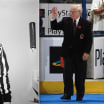To that end, the Bruins cut ties with veteran defenseman Dennis Seidenberg, who had two years remaining on a four-year, $16 million contract. The latter move was a "very, very difficult decision," Sweeney said. "We've wrestled with this decision for quite some time."
That was the hard move. The easier one was locking down Krug, a player Sweeney said has a "very, very unique skill set that's important to our hockey club."
The 25-year-old offensive defenseman had an NHL career-high 44 points this season (four goals, 40 assists) in 81 games. He was tied for 19th in points among defensemen in the League, and ninth in assists. And that all came after he signed a one-year contract in March of 2015. It was his second straight one-year deal, this one worth $3.4 million.
Krug believed that he could prove himself worthy of a long-term, big-money commitment. That gamble paid off Thursday, one day before NHL free agency opens, as Krug signed a contract that appears to work well for both sides. It also has some protection for Krug, with a limited no-trade clause in the final two years of the contract, according to Sweeney. Those otherwise would have been unrestricted free agency years.
"He does things the right way every time he comes to the rink and he wants to get better," Sweeney said. "He's not satisfied, all the things you want other young players to identify with, which is something that we also acknowledge, that Torey has really been identified as an emerging part of our core leadership group."



















